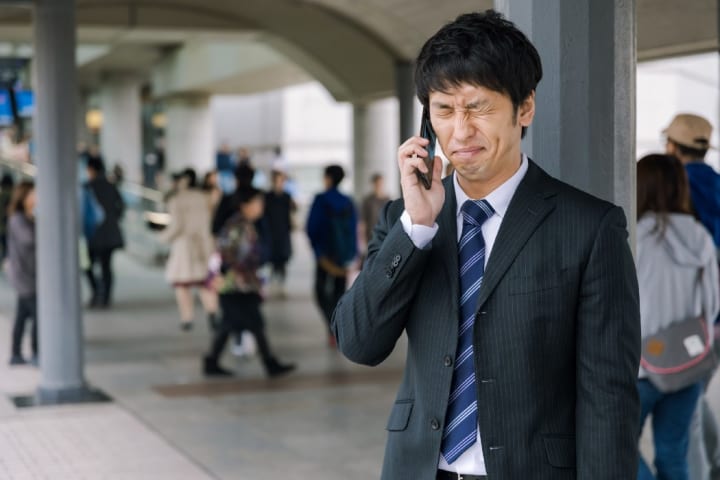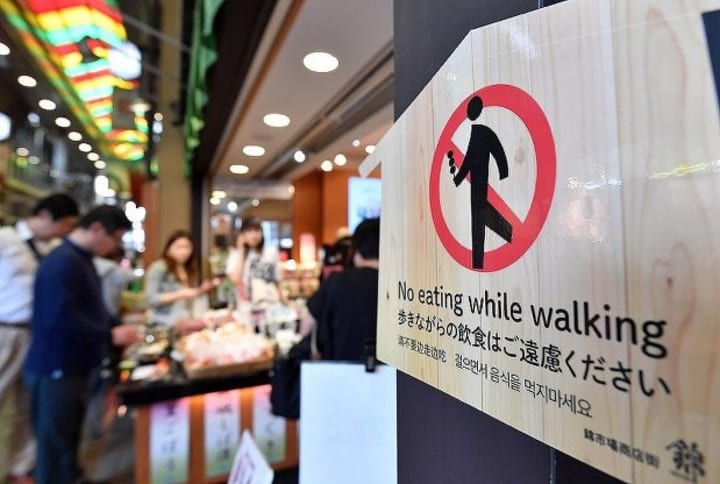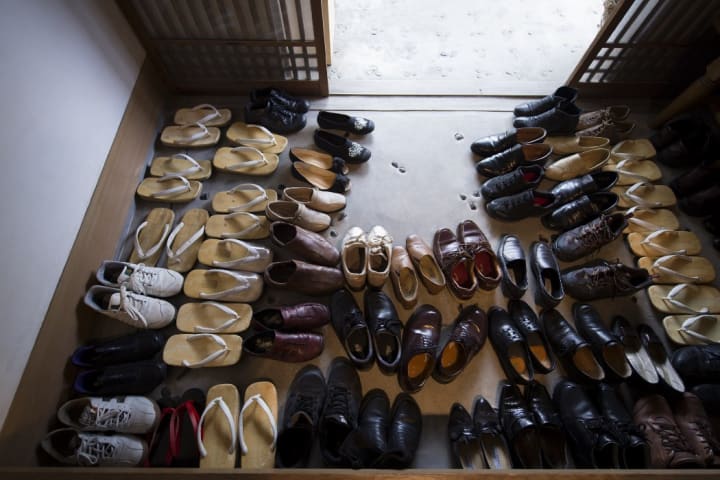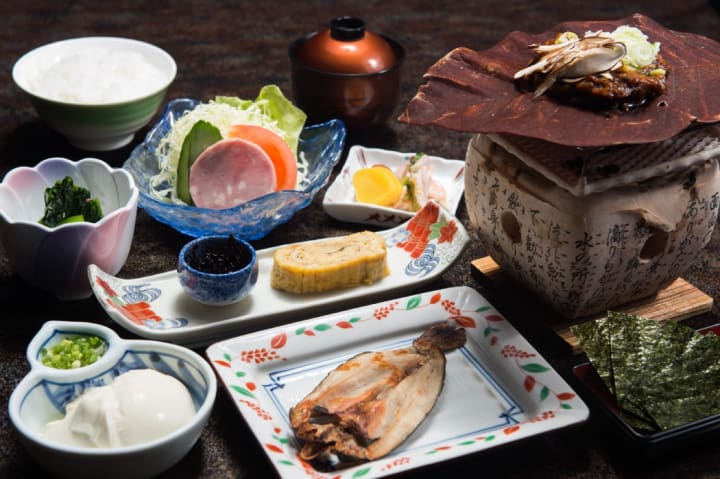13 Things That Annoy Japanese People
What to avoid when you visit the Land of the Rising Sun

Each country has its own values, culture, and way of doing things. When you visit a country it’s always good to know what does and doesn’t fly in that country. Japan is no different. A country with its own unique language, food, culture, and way of life, many people visit the country not knowing what types of behavior are acceptable or offensive.
Here are 13 situations that you might come across in Japan and how to handle them. Depending on the person, location in Japan, and social situation, some people might be stricter while other times you might get more leeway because you are not Japanese.

Noise On The Train
Public transportation is a big part of Japanese life. Especially in big cities, most people take buses, trains, subways, and bullet trains rather than drive. With all the massive amount of people commuting throughout the day, the transportation system in Japan is quite efficient. It’s also surprisingly quiet.
Even during rush hour, as thousands of people cram together on trains to get to work and school, noise is at a minimum. Rarely will you find anyone talking out loud with others or on the phone.
Because of overworking, long commutes, and stress, most Japanese people are sleeping. It is their time of day to decompress and get some rest. Others are reading manga, watching something on their phone, listening to music, or playing video games. Even headphone volume is at a minimum to reduce sound pollution.
Any time there is someone on the train talking, laughing, having a conversation, or talking on the phone, the people around seem to get bothered and give lots of dirty looks. To avoid the evil stare, try to stay as quiet and invisible as possible.

Phone Usage In Public
Much like in trains, smartphones are usually used in public for anything but talking. Out and about Japan, you will see many people on their smartphones either texting someone, checking their email, shopping online, playing online games, or streaming some entertainment. Rarely will you see someone on their phone talking to someone. And if they are, they are using a Bluetooth headset and are trying to speak quietly.
Despite the original use of the phone as a way to communicate with someone vocally, recently phones are used for anything but talking. Especially in public places like restaurants, cafes, trains, etc.
If possible, avoid talking on the phone in public. If you need to talk on the phone, find a place to sit or a corner where you are not disturbing anyone. Also, it is not only bothersome but dangerous to walk and use your smartphone so beware of that. Posters around Japan ask people not to use their phones while walking and people will most likely tsk tsk at you if they see you do it.

Sitting In Priority Seats
You will find priority seating in buses, trains, waiting areas, and anywhere public. These seats are for those who require priority seating because of specific reasons. If you someone is physically or mentally disabled, pregnant women, those who have injuries, senior citizens, and others who have trouble standing for long periods of time.
It is recommended not to sit in those seats even if there are no people who look like they need it. Japanese people are very polite and often don’t express themselves in public so even if they need a priority seat, might not say anything. It’s better to stand or find seats elsewhere if possible.
Especially if you are young and don’t look like you need a priority seat, you will find the people around you make you feel guilty for sitting down in that seat. It’s easy to tell if the seat is priority because usually there is a sign and the color of the seat differs from regular seats.

Extreme PDA
PDA stands for public displays of affection. Usually things like kissing, holding hands, hugging, or touching. Depending on the country, there might be some social norms about PDA. In Japan, PDA is not non-existant. Actually, out and about you will probably see many couples holding hands, hugging, and possibly even kissing. However, the PDA in Japan seems to be more conservative and cute rather than deep and passionate.
Things like holding hands, putting your head on the person’s shoulder, or having your hand around the person’s waist as you walk are normal. But sitting someone’s lap, making out with tongues, and grabbing ass is a bit extreme. Maybe a drunk Japanese couple at the end of a party night might do these things in public, but overall these things are left in the bedroom.
Japanese people might be a little more forgiving to foreigners because they are from a different culture, but they will still feel uncomfortable and prefer not to see such passionate acts in public. Just be aware of your surroundings.

Eating While Walking
Depending on what country you are from, this might be similar but Japanese people really don’t eat and walk. And they get really fussy when they see someone who does. Partly because Japan is such a clean country and very structured, they believe food should be eaten in places set aside for food like restaurants, cafes, lunchrooms, or rest areas.
The exception is summer festivals. There are many festivals that have many outdoor food stands where people can buy food and walk around eating and enjoying the sights.
But eating on the train, walking down the street, or while out and about in public is usually not acceptable. Especially foods that are difficult to eat or have a strong smell. You might occasionally see someone eating a banana, rice ball, or snack bar but overall most Japanese wait to find a place where they can sit like a park bench or food court.
If possible hold off on eating in public. But drinking is not a problem so sipping from a water bottle or coffee cup while on your commute is fine.

Blowing Your Nose
You would think carrying tissues and blowing your nose rather than using your sleeve would be polite and appropriate behavior. But blowing your nose in public, especially in confined spaces like a train, office, or shop is considered rude.
Rather than blowing your nose, you will find that Japanese people will continuously sniff rather than blow. Coughing and sneezing are acceptable as long as you cover your mouth but blowing for some reason doesn’t mesh with this culture. So unless you really have to, keep sniffling until you are alone, before pulling out a tissue and clearing your nasal passage.

Opening Taxi Doors
Being polite and holding doors will go along with Japanese people as you will be seen as a gentleman or someone who is mindful of others. Unless of course, the door is a taxi door. In Japan, the back doors of a taxi are automatic and are controlled by the driver.
When flagging down a driver, the driver will stop and swing the door open for you to enter. Likewise, at the end of the ride, after the driver receives payment, they will use the lever at the front to have the back doors open.
Taxi drivers do not like it when someone tries to enter or exit their taxi using the door handle. The taxi is their turf and they control it so hands-off. Similar to an elevator operator protective of their buttons, a taxi driver is protective of their back doors.
Also, in times of Covid, not having to touch door handles to enter and exit is a bonus.

Not Removing Your Shoes
Most Asian countries have a no-shoes-in-the-house policy and Japan is no different. You must take off your shoes when you enter a Japanese home. Some Japanese homes provide indoor slippers while others are fine with just socks or bare feet.
But Japan goes one step beyond the no-shoe policy. Many workplaces and schools require everyone to remove their shoes and wear indoor shoes or slippers instead. Restaurants, hotels, hot springs, and temples also require visitors to remove their shoes, place them in a locker and either wear indoor shoes or go in socks.
And sometimes, just like in Inception, you will have to change shoes within shoes. For example, even if you are wearing indoor shoes or slippers, you will have to remove those to enter toilets or rooms that have tatami mat flooring.
It is recommended to bring shoes that are easy to slip in and out of to save time and easily enter and exit all these places that require shoe removal.

Wearing A Black Tie At A Wedding
Black tie events such as weddings would have no problem with black ties, is what you would think. However, weddings require you to wear a tie other than black; most men wear white. Black represents death and black ties are used at funerals.
In other “black tie” events, most people avoid wearing black and stick to lighter colors. If you are ever invited to a wedding or happy event, it would be good to have a light-colored tie. If you don’t have a tie and don’t have time to visit a suit shop, you can find surprisingly good ties at convenience stores or even the 100 yen shop (the equivalent of the dollar store).

Taking The Last Piece Of Food
If you are ever in Japan for more than just a quick vacation, you will most likely be invited to some sort of get-together. Whether it be with friends, family, colleagues, or some group, you will have the opportunity to dine with Japanese people.
Often as the night goes on, you will notice that there is one piece of food remaining on all the dishes. This is common when people are sharing dishes and no one wants to take the last piece.
Japanese find it rude or inconsiderate to take the last piece for themselves. And asking others if it’s ok for you to take the last piece also seems selfish so the last piece usually sits there uneaten.
Rather than eat the last piece, most Japanese people will offer it to someone else. If everyone else refuses, then they will go ahead and eat the last piece. This is a good tactic if you really want something specific. For example, if you want the last chicken wing, you can offer it to others. Hopefully, they will all refuse and you will be able to eat it guilt-free.
Another option is to use reverse psychology and offer something you don’t want to eat in exchange for something you do. So if you really want that last piece of sushi but don’t want to seem rude, you can say, “Oh look, there is still some sushi and a chicken wing. How about I eat the sushi and you take the chicken?” Most Japanese will accept and once again you will be able to enjoy the last piece of food guilt-free.

Chopstick etiquette
There are so many rules with eating chopsticks, no one expects a foreigner to remember them all. But here are the most important ones you should remember when eating with Japanese.
The most important is probably not to stick your chopsticks straight up in rice. Instead, when you are not using your chopsticks, you should place them on the holder or along the bowl or plate. Sticking chopsticks directly in rice is an offering to the dead which is performed at funerals.
Secondly, never pass something from your chopsticks directly to someone else’s chopsticks. This is considered highly rude and will aggravate Japanese people. They will be reminded once again of death as this ritual is used at funerals. After cremation, relatives use chopsticks to pass the bones of their loved ones to each other to place in an urn.
Finally, rubbing chopsticks together, which is acceptable in some Asian countries as well as North America, is not done in Japan. It makes sense to rub wooden chopsticks together to remove debris and splinters, but in Japan, it comes across as rude.
Overall, treating chopsticks with respect will go a long way to appease Japanese people.

Hot spring etiquette
Much like dining with the Japanese, bathing with them also requires some knowledge. If you are hoping to experience an authentic Japanese experience, then visiting an onsen (hot spring) or public bath is essential.
Before entering the hot spring, definitely take a shower beforehand. Not showering and entering the hot spring will shock and offend other Japanese bathers. No one wants to sit in a tub of water and see dry skin flakes and hair follicles floating by. Showering with soap before entering the hot spring ensures it is clean for everyone.
Also, despite shyness and apprehension from others seeing your naked body, swimsuits (even tiny thongs) are not allowed in a hot spring bath. You must be completely naked when entering the bath.
There is a small hand towel provided that you can use to cover your private parts while walking from the shower to the bath but this towel can not be dipped into the bathwater. Also, tattoos are usually not allowed in public baths and hot springs but if you can cover them with band-aids or waterproof patches, you will be able to enter.
Try not to splash around, swim, or play in the hot spring area. This area is a calm space for people to release stress, soak, and rejuvenate their minds and bodies. It’s not the pool at the local YMCA.

Business card etiquette
Doing business in Japan is also quite popular so you might be in town for work, business meetings, or conferences. Knowing some simple business etiquette will go a long way in showing your respect and understanding of the Japanese culture.
Bowing is always good both before and after meeting someone in a business situation. Along with bowing and introducing yourself, most Japanese people carry a case containing business cards. They present the card with two hands while introducing themselves and bowing.
When accepting a business card, always accept it with two hands and look at the card. Rather than putting it in your pocket or putting it away, keep holding it until you part from the person. When presenting your card, also use both hands to pass the card.
Folding the card, or writing on the back of the card is seen as rude and Japanese businessmen might think you are unrefined and rude. Having a business card holder or case is always a good idea to ensure the card remains in good shape and shows the other person you care about them.
There are many things in Japan you will come across and situations where you might not know what to do. As a foreigner, most Japanese will not expect you to know exactly what to do. They don’t expect you to act the same way as a Japanese person and for this reason, they will be much more accommodating to your culture.
That being said, it’s always good to know what kind of things are considered rude, in a different culture before you go. Knowing what offends a group gives you an advantage over others and helps build better relationships. To take advantage of all the amazing things Japan has to offer, going with a positive attitude and doing your best to stay humble and open to new things is the best way.
This article also appears here: https://medium.com/fml-or-bust/13-things-that-annoy-japanese-people-2490332c674
About the Creator
S.A. Ozbourne
A writer with no history or perspective is a paintbrush with no paint!






Comments
There are no comments for this story
Be the first to respond and start the conversation.